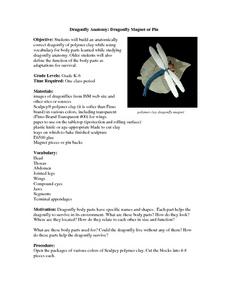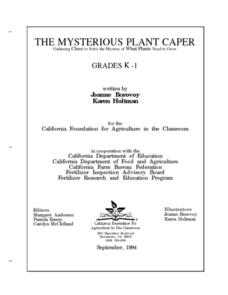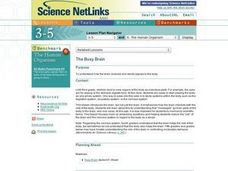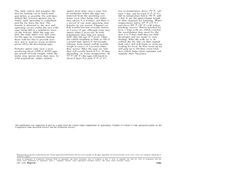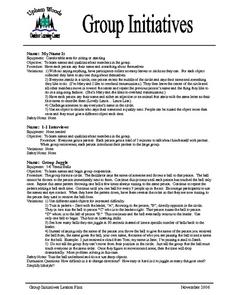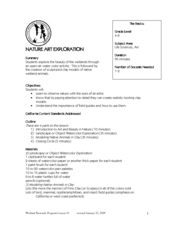Curated OER
Dragonfly Anatomy: Dragonfly Magnet or Pin
Students build anatomically correct dragonflies of polymer clay, use vocabulary for body parts, and define the function of the body parts as adaptations for survival.
Curated OER
THE MANY COLORS OF SUNLIGHT
Students examine rainbow components, spectral colors, colors perceived by the eye, hot solids, glowing rarefied gas, absorption, that light is a wave, and optics.
Curated OER
Cells All Around
Students measure the size of an epithelial cell and to estimate the number of epithelial cells in a given area of the body. After watching a video on cells, student groups perform an experiment using a microscope to view some of their...
Curated OER
The Periodic Table of the Elements
Students research the elements used to create fireworks. In this periodic table lesson plan, students discuss common metals, their characteristics, and their places on the periodic table. They work in small groups to research the...
Curated OER
Health-Nervous System Review
In this nervous system worksheet, students are given seventeen clues about structures of the nervous system and they put their answers in a crossword puzzle.
Curated OER
The Mysterious Plant Caper
Students investigate the basic parts of plant and that plants are living things which require water, air, light and nutrients for survival. They do this through a series of scientific experiements and multi-curricular hands-on activities.
Curated OER
The Busy Brain
Students explore biology by completing a human body worksheet. For this human brain lesson, students identify the different anatomy within the brain and the functions those pieces form. Students read an article about signals in the brain...
Curated OER
Puppetry
Students explore puppetry. For this puppetry lesson, students research the history and culture of puppets. Student begin to understand that art work has special characteristics. Students create their own marionette puppet.
Curated OER
I'm Here, I'm There, I'm Everywhere-I'm Super Spud!
Students generate a computer model of a potato plant. In this potato lesson plan, students study the history of potatoes, the variety of potatoes, the functions of the potato plant parts, and make a potato model on the computer.
Howard Hughes Medical Institute
Understanding Variation
Does where we live influence how our bodies express genetic traits? Explore variation in human skin color with an activity that incorporate video and hands-on learning. Individuals model the relationship between phenotypes and genotypes,...
Curated OER
The Human Organism
Students identify their feelings and learn constructive ways of handling conflict. In this feelings and conflict lesson, students read a story about conflict and identify ways to understand emotions and resolve conflict.
Curated OER
Insects: Grasshoppers
Students examine grasshoppers as they practice following instructions. In this biology lesson plan, students identify the characteristics of grasshoppers and the functions of grasshoppers' external body parts.
Curated OER
Channel Catfish
Students study the life and biology of the Channel Catfish. In this aquatic biology instructional activity, students will examine the external and internal features of the catfish along with their breeding habits and environment. This...
Curated OER
Group Initiatives
Learners explore the names and qualities about members in the group. They each say their name and something about themselves. Students gather around in a circle. They listen to the teacher as he or she says the name of someone and throws...
Curated OER
The Brain Reflex System And How It Works
Students explore reflexes. In this biology lesson plan, students discover the basic facts about the reflex systems of the brain as they take part in hands-on activities.
Curated OER
What is Inside a Seed?
Middle schoolers observe how the bean seed has changed after being soaked in water overnight and record their observations. They open the bean and observe the inside. Finally, students draw and label the parts of a bean seed and write...
Curated OER
Beaver Ecology
Students explore the lives of bgeahvers. They identify the physical and behavioral adaptations that help beavers survive in their environment. Students compare and contrast how beavers influence the ecology of both forest and aquatic...
Curated OER
Observing Leaves and Flower Buds
Pupils observe the first true leaves and the buds on their Brassica plants and record their observations in both words and pictures. They also observe two major developments: the true leaves and the flower buds and record their...
Curated OER
Looking at Flowers
Students use their bee sticks to cross-pollinate their Fast Plants and also focus in on the anatomy of flowers. They analyze how the parts of a system go together, and how these parts depend on each other. Finally, students describe...
Curated OER
How Does Your Plant Grow?
Students measure and record their height in centimeters on a graph. By integrating math and science, students collect data and apply graphing skills to the experiences they are having growing plants. Finally, students identify how to...
Curated OER
Getting a Handle on Your Bee
Students observe dried bees, carefully glue them to toothpicks, and use them for cross pollinating their Brassica plants. They also describe reasons why two similar investigations can produce different results. Finally, students...
Curated OER
Friendship Begins with A Smile
Pupils examine the emotions behind different facial expressions. They explain how it feels when someone smiles at them and practice smiling and speaking to someone with eye contact. They also demonstrate the characteristics of active...
Curated OER
Treasure Hunt
Students actively search a the ground outside and find several types of leaves, lichen, feathers and trash. They place items into journals, write entries, draw pictures and ask questions about the items found on their exploration.
Curated OER
Nature Art Exploration
Students draw a nature landscape using watercolors. In this life science lesson, students share their personal experience on the beauty of nature. They create clay models of different native animals.


